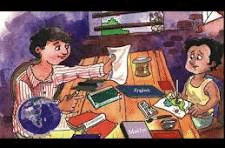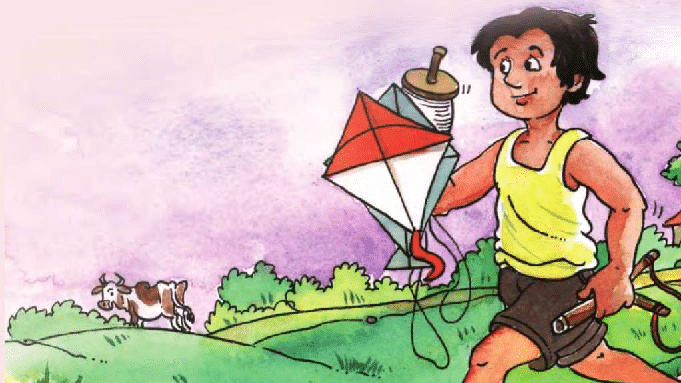My Elder Brother Class 5 Notes English Marigold
Introduction
The main theme of the play is the importance of education and the balance between studying and enjoying life. It teaches us that while school education is critical, experiences in life also play a significant role in our learning. The relationship between Bhaiya and Munna highlights the bond of love and responsibility between siblings. The play shows that being serious about studies is essential, but it is also important to take breaks and play. It conveys that learning from parents and real-life situations is equally valuable as formal education in school. The message encourages children to take their studies seriously but also to appreciate the joys of childhood.

Detailed Summary
Scene 1
This short play tells the story of two brothers, Bhaiya and Munna, who live in a hostel. Bhaiya is the older brother, aged 14, and he is very serious about his studies. Munna, the younger brother, is only 9 years old and loves to draw pictures instead of studying. The play shows their different attitudes towards education and learning from life experiences.
In the first scene, we see Bhaiya reading a book at the study table while Munna is happily drawing birds and animals. Bhaiya asks Munna why he is not studying and where he was in the morning. Munna replies that he was playing outside. Bhaiya explains that he sits with his book for a long time because he wants to build a strong foundation in his education. He believes that if you have a strong base, you can succeed in life. Sometimes, he feels that it takes him a long time to finish his schoolwork because he wants to do it well.
Munna, curious about why Bhaiya studies so hard, questions the need to write the same word or sentence many times. Bhaiya responds that learning English is challenging and needs a lot of effort. He points out that Munna often runs off to play games like marbles or fly kites instead of studying. Bhaiya worries that if Munna keeps playing, he might not do well in school and waste their father’s hard-earned money.
When Munna expresses a desire to run away and go home, Bhaiya comforts him and decides to create a study timetable for Munna. He lists out a strict schedule that includes time for studying different subjects, with a little time for strolling and playing. Munna, feeling overwhelmed, asks when he will have time to play, but Bhaiya insists that studying is more important. Munna longs for the fun of playing outside in the green fields, but Bhaiya is focused on education and studying hard.
Scene 2
We learn that the results of their exams are out. Munna has passed his class, while Bhaiya has failed again. Bhaiya feels very sad about his failure, but Munna is happy about his success. Despite Munna’s joy, he feels bad for his brother and wants to help him feel better. This leads to Munna becoming a bit naughtier and spending more time playing.
Scene 3
We see a turning point. Bhaiya confronts Munna about his kite flying, reminding him that he is now in eighth grade and should take his studies seriously. Bhaiya explains that learning does not only come from books, but also from life experiences. He reminds Munna of their parents, who, despite not being highly educated, have valuable life knowledge. They can guide and help them in difficult situations because of their experiences.
Munna realizes that Bhaiya is right. He understands that if Bhaiya were to get sick, their father would know what to do because he has more life experience. Munna then expresses his love for Bhaiya and apologizes for not listening earlier. This moment brings them closer together, showing that while studying is important, caring for each other and learning from life is also vital.
In conclusion, the play emphasizes the importance of education, hard work, and the balance between studying and enjoying life. It teaches us that while books are important, experiences and family connections are equally valuable in shaping who we are.

Difficult Words
- Affectionate: Showing love and care towards someone.
- Respectful: Showing politeness and honor towards others.
- Foundation: The base or groundwork that supports something.
- Timetable: A plan that shows when specific tasks should be done.
- Punctuality: Being on time for activities or events.
- Geometry: A branch of mathematics that deals with shapes and sizes.
- Experience: Knowledge or skill gained from doing something over time.
- Responsibility: A duty to take care of someone or something.
- Scolding: Speaking angrily to someone for doing something wrong.
- Essays: Short pieces of writing on a specific topic.
- Examiners: People who evaluate or test students' knowledge.
- Wisdom: The ability to use knowledge and experience to make good decisions.
- Interacting: Engaging or communicating with others.
- Motivation: The reason behind doing something or wanting to achieve a goal.
- Compassion: A feeling of sympathy and concern for others’ suffering.
|
22 videos|156 docs|67 tests
|
FAQs on My Elder Brother Class 5 Notes English Marigold
| 1. Who is the main character in "My Elder Brother"? |  |
| 2. What qualities does the elder brother possess? |  |
| 3. How does the younger brother feel about his elder brother? |  |
| 4. What lessons can be learned from the story? |  |
| 5. Why is the relationship between the brothers significant in the story? |  |
















